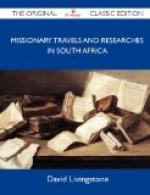The fact of other avenues of wealth opening up so readily seems like a providential invitation to forsake the slave-trade and engage in lawful commerce. We saw the female population occupied, as usual, in the spinning of cotton and cultivation of their lands. Their only instrument for culture is a double-handled hoe, which is worked with a sort of dragging motion. Many of the men were employed in weaving. The latter appear to be less industrious than the former, for they require a month to finish a single web. There is, however, not much inducement to industry, for, notwithstanding the time consumed in its manufacture, each web is sold for only two shillings.
On returning to Golungo Alto I found several of my men laid up with fever. One of the reasons for my leaving them there was that they might recover from the fatigue of the journey from Loanda, which had much more effect upon their feet than hundreds of miles had on our way westward. They had always been accustomed to moisture in their own well-watered land, and we certainly had a superabundance of that in Loanda. The roads, however, from Loanda to Golungo Alto were both hard and dry, and they suffered severely in consequence; yet they were composing songs to be sung when they should reach home. The Argonauts were nothing to them; and they remarked very impressively to me, “It was well you came with Makololo, for no tribe could have done what we have accomplished in coming to the white man’s country: we are the true ancients, who can tell wonderful things.” Two of them now had fever in the continued form, and became jaundiced, the whites or conjunctival membrane of their eyes becoming as yellow as saffron; and a third suffered from an attack of mania. He came to his companions one day, and said, “Remain well. I am called away by the gods!” and set off at the top of his speed. The young men caught him before he had gone a mile, and bound him. By gentle treatment and watching for a few days he recovered. I have observed several instances of this kind in the country, but very few cases of idiocy, and I believe that continued insanity is rare.
Chapter 21.
Visit a deserted Convent—Favorable Report of Jesuits and their Teaching —Gradations of native Society—Punishment of Thieves—Palm-toddy; its baneful Effects—Freemasons—Marriages and Funerals—Litigation—Mr. Canto’s Illness—Bad Behavior of his Slaves—An Entertainment—Ideas on Free Labor—Loss of American Cotton-seed—Abundance of Cotton in the country—Sickness of Sekeletu’s Horse—Eclipse of the Sun—Insects which distill Water—Experiments with them—Proceed to Ambaca—Sickly Season—Office of Commandant—Punishment of official Delinquents— Present from Mr. Schut of Loanda—Visit Pungo Andongo—Its good Pasturage, Grain, Fruit, etc.—The Fort and columnar Rocks—The Queen of Jinga—Salubrity of Pungo Andongo—Price of a Slave—A Merchant-prince—His Hospitality—Hear of the Loss of my Papers in “Forerunner”—Narrow Escape from an Alligator—Ancient Burial-places—Neglect of Agriculture in Angola—Manioc the staple Product—Its Cheapness—Sickness—Friendly Visit from a colored Priest—The Prince of Congo—No Priests in the Interior of Angola.




